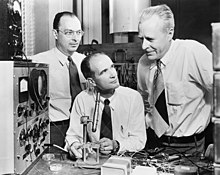History of electronic engineering
Chambers Twentieth Century Dictionary (1972) defines electronics as "The science and technology of the conduction of electricity in a vacuum, a gas, or a semiconductor, and devices based thereon".
Electronics engineering (even before it acquired the name) facilitated the development of many technologies including wireless telegraphy, radio, television, radar, computers, and microprocessors.
These include the spark-gap transmitter and the coherer with early demonstrations and published findings by David Edward Hughes (1880)[9] and Heinrich Rudolf Hertz (1887 to 1890)[10] and further additions to the field by Édouard Branly, Nikola Tesla, Oliver Lodge, Jagadish Chandra Bose, and Ferdinand Braun.
[11][12] Millimetre wave communication was first investigated by Jagadish Chandra Bose during 1894–1896, when he reached an extremely high frequency of up to 60 GHz in his experiments.
[15][16] In 1904, John Ambrose Fleming, the first professor of electrical Engineering at University College London, invented the first radio tube, the diode.
Then, in 1906, Robert von Lieben and Lee De Forest independently developed the amplifier tube, called the triode.
[17] The first known radio news program was broadcast 31 August 1920 by station 8MK, the unlicensed predecessor of WWJ (AM) in Detroit, Michigan.
Vacuum tubes remained the preferred amplifying device for 40 years, until researchers working for William Shockley at Bell Labs invented the transistor in 1947.
These non-integrated circuits consumed much space and power, were prone to failure and were limited in speed although they are still common in simple applications.
By contrast, integrated circuits packed a large number — often millions — of tiny electrical components, mainly transistors, into a small chip around the size of a coin.
The trend is for even lower power devices such as the organic light-emitting diode displays, and it is most likely to replace the LCD and plasma technologies.
These included radio beam guidance of bombers, electronic counter measures, early radar systems, etc.
[30]The earliest experimental MOS IC chip to be fabricated was built by Fred Heiman and Steven Hofstein at RCA Laboratories in 1962.
Modern computers based on integrated circuits are millions to billions of times more capable than the early machines, and occupy a fraction of the space.
The ability to store and execute lists of instructions called programs makes computers extremely versatile, distinguishing them from calculators.
His concept was part of an order by Japanese company Busicom for a desktop programmable electronic calculator, which Hoff wanted to build as cheaply as possible.
Hybrid specializations such as computer engineering have emerged due to the detailed knowledge of the hardware that is required for working on such systems.


